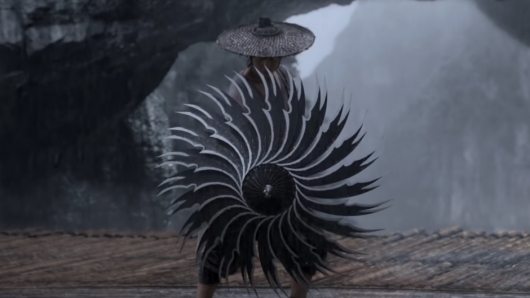
From the second its trailer first begins, Shadow’s imaginative cinematography was on full display, positioning the film as a must see based on visuals alone. The theme at the center of the film is duality (more on that later) and Shadow’s production design consisting of black-and-white monochrome amidst color photography complimented the story perfectly. The yin-yang symbol appears throughout with character costumes contrasting with the set pieces, creating astonishing images that never cease to pop and draw your eyes to the screen. Indeed, the characters’ wardrobe also tell a story, such as Jing normally being adorned in black robes but switching to white when alone with Madam and preparing to sleep, signifying their connection.
While Shadow’s visual flair may have been the initial draw for many, the storytelling at the heart of the film also packs a punch as a twisting tale of a quest for the power of the throne. As Commander Yu jockeys for position at the head of the Pei kingdom through manipulation and backstabbing, we are presented with the concept of duality in how the players in this story react to their parts in this power play and how they interact with one another, with the black and white color palate also hearkening to a courtly game of chess. Commander Yu and his plan are highly duplicitous, posing as an ally and advisor of Jing but later being revealed to have his own motivations and plans for Jing’s fate. We also have Jing who is caught in-between the life he is pretending to live as the top military commander in Pei and his reality of being a decoy and pawn in the real Commander Yu’s quest for power and revenge. Leading this dual existence takes a toll on Jing, leaving him questioning his place in it all and what his fate will be in the end. His initial motivations are just to reunite with his mother, whom Commander Yu’s father located before his death and Jing is promised he will be reunited with after defeating General Yang. Even the King of Pei is not all that he appears to be as the film’s plot progresses and reveals itself. All of these machinations and moves by the characters in the ensemble provide a Shakespearean tale that is as thrilling as it is tragic and winding.
Shadow begins as mostly narrative, introducing characters and their backstories slowly and methodically. It isn’t until the film’s third act that we’re presented with substantial action scenes, but what we are treated to are worth the wait. The combat involving swords, crossbows, hundreds of extras, and even weaponized umbrellas are expertly choreographed to provide flair, excitement, and a sense of freshness to cineplexes that are inundated with them as of late. The fights crafted by director Zhang Yimou also contain slow motion effects that somehow avoid seeming and looking cliché.
Shadow is a visually breathtaking and stunning film that also contains a very compelling, Shakespearean story full of courtesan intrigue and maneuvering. The film begins a little slowly but explodes in the third act featuring a number of turns and surprises that serve as a payoff for the slow pace and set up that come before it. The action scenes are rife with mesmerizing choreography that fit the story being told and serve a purpose rather than just being something to distract the audience from any narrative issues or serve as flashy but hollow scene filler. Director Zhang Yimou presents battles that have stakes and emotional pull that invest the viewers in their outcome due to the groundwork that was laid beforehand. In one of the year’s best performances so far, Deng Chao shines as both Jing and Commander Yu, nailing the two polar opposite characters and disappearing in the roles to the point where many viewers won’t realize it’s the same actor. Shadow is the type of inventive, creative film that the United States is making less and less of.
Image: Village Roadshow Pictures Asia

